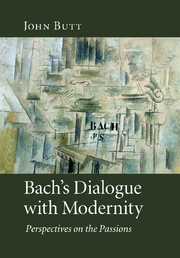Book contents
- Frontmatter
- Contents
- Preface
- List of abbreviations
- Introduction
- 1 Bach's Passions and the construction of early modern subjectivities
- 2 Bach's Passions and the textures of time
- 3 The hermeneutic perspective – negotiating the poles of faith and suspicion
- 4 The voices we hear and the construction of narrative authority
- 5 Between rhetoric and dialectic – Bach's inventive stance
- Afterword
- Appendix
- Bibliography
- Index
3 - The hermeneutic perspective – negotiating the poles of faith and suspicion
Published online by Cambridge University Press: 26 February 2010
- Frontmatter
- Contents
- Preface
- List of abbreviations
- Introduction
- 1 Bach's Passions and the construction of early modern subjectivities
- 2 Bach's Passions and the textures of time
- 3 The hermeneutic perspective – negotiating the poles of faith and suspicion
- 4 The voices we hear and the construction of narrative authority
- 5 Between rhetoric and dialectic – Bach's inventive stance
- Afterword
- Appendix
- Bibliography
- Index
Summary
It will already be entirely clear that I see considerable value in interpreting Bach's Passions in terms of extra-musical issues, particularly the broader historical conditions in which modernity developed. In fact, it is difficult to avoid extra-musical readings of any music whatsoever since even a ‘purely musical’ reading will evoke ideals – such as unity, integrity or cohesion – which are among the moral or political values of a wider culture. But once we allow that music can be discussed in relation to the extra-musical, it is surprisingly difficult to negotiate the borders between plausible readings and ones that are patently illegitimate. For instance, it is clear that I am not necessarily privileging readings that the composer or his associates might consciously have intended (interesting and significant though these can often be). Intentions initially seem to provide a convenient way of delimiting any enquiry that concerns the meaning of any particular work, but this direction soon brings with it problems of knowledge. How do we really know of anyone's intentions, and how can these be plucked out of the continuum of a person who lived within time? This problem of interpreting an author's will, intentions and meaning was recognized even during Bach's lifetime. There is also the question of relevance: whatever might be particularly valuable to us, or to others, could be precisely what the composer did not intend.
- Type
- Chapter
- Information
- Bach's Dialogue with ModernityPerspectives on the Passions, pp. 146 - 192Publisher: Cambridge University PressPrint publication year: 2010



